Digital Forensics and Incident Response Reflection Essay
VerifiedAdded on 2022/08/25
|5
|747
|18
Essay
AI Summary
This essay is a personal reflection on the digital forensics skills acquired during a module focused on digital forensics and incident response. The student discusses the development of technical, analytical, and communication skills, highlighting the impact of personal experiences on their approach to digital forensics. The essay covers practical sessions, focusing on the application of cybersecurity forensics to examine malware, data breaches, and other incidents. The student reflects on their growth, improved problem-solving abilities, and the importance of staying updated with the latest threats. The essay concludes with a summary of the skills learned and how their personal experiences have shaped their approach to digital forensics. The student also emphasizes the importance of teamwork and communication within the field.
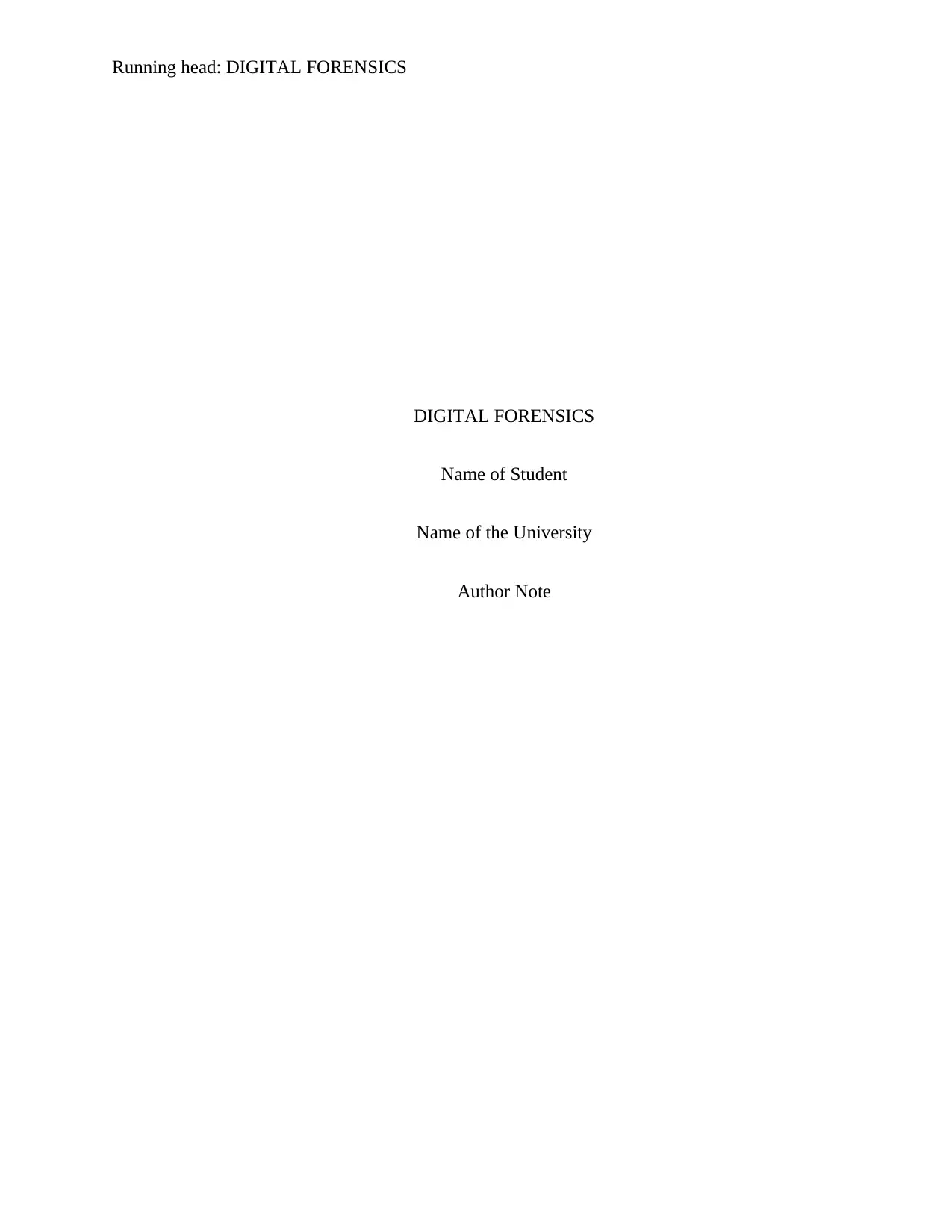
Running head: DIGITAL FORENSICS
DIGITAL FORENSICS
Name of Student
Name of the University
Author Note
DIGITAL FORENSICS
Name of Student
Name of the University
Author Note
Paraphrase This Document
Need a fresh take? Get an instant paraphrase of this document with our AI Paraphraser
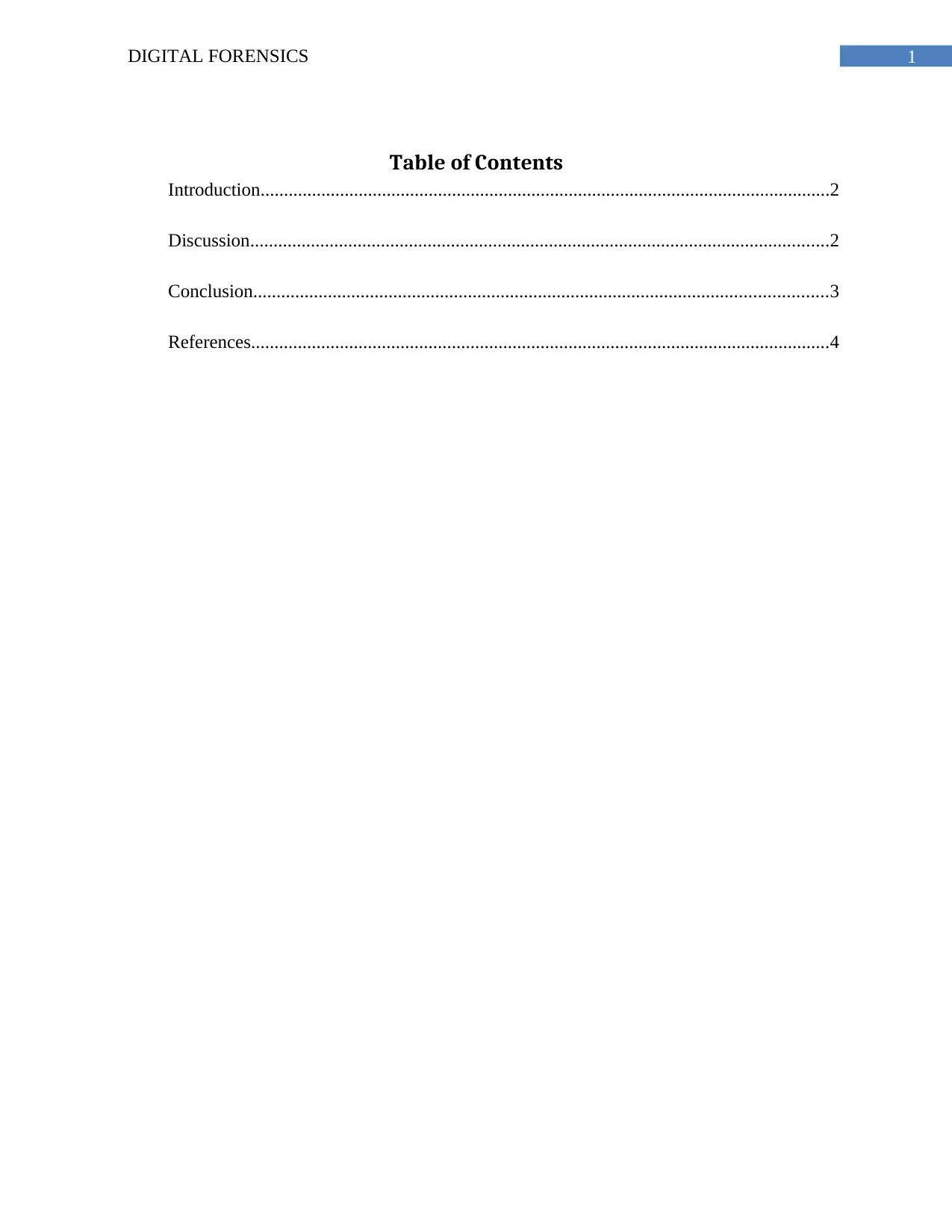
1DIGITAL FORENSICS
Table of Contents
Introduction..........................................................................................................................2
Discussion............................................................................................................................2
Conclusion...........................................................................................................................3
References............................................................................................................................4
Table of Contents
Introduction..........................................................................................................................2
Discussion............................................................................................................................2
Conclusion...........................................................................................................................3
References............................................................................................................................4
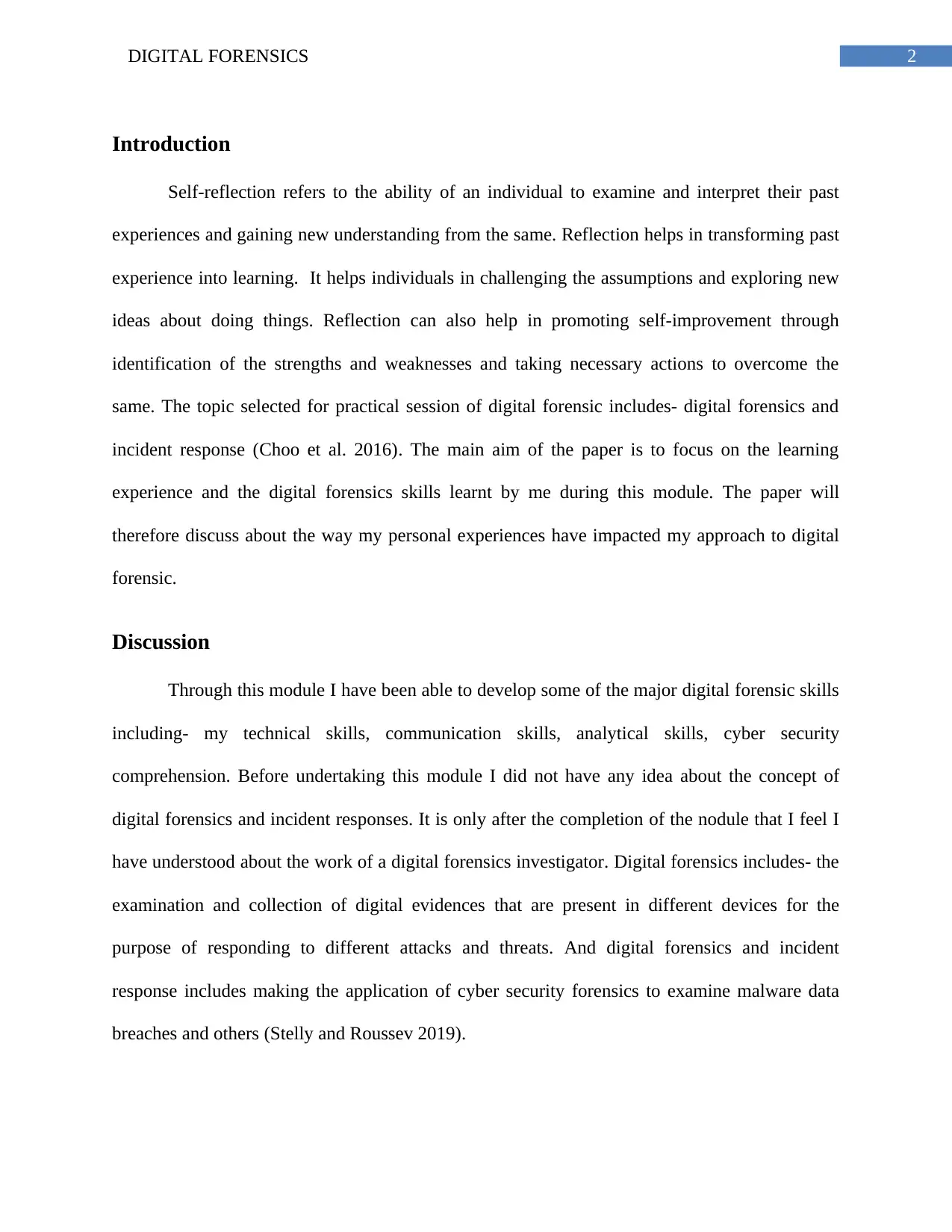
2DIGITAL FORENSICS
Introduction
Self-reflection refers to the ability of an individual to examine and interpret their past
experiences and gaining new understanding from the same. Reflection helps in transforming past
experience into learning. It helps individuals in challenging the assumptions and exploring new
ideas about doing things. Reflection can also help in promoting self-improvement through
identification of the strengths and weaknesses and taking necessary actions to overcome the
same. The topic selected for practical session of digital forensic includes- digital forensics and
incident response (Choo et al. 2016). The main aim of the paper is to focus on the learning
experience and the digital forensics skills learnt by me during this module. The paper will
therefore discuss about the way my personal experiences have impacted my approach to digital
forensic.
Discussion
Through this module I have been able to develop some of the major digital forensic skills
including- my technical skills, communication skills, analytical skills, cyber security
comprehension. Before undertaking this module I did not have any idea about the concept of
digital forensics and incident responses. It is only after the completion of the nodule that I feel I
have understood about the work of a digital forensics investigator. Digital forensics includes- the
examination and collection of digital evidences that are present in different devices for the
purpose of responding to different attacks and threats. And digital forensics and incident
response includes making the application of cyber security forensics to examine malware data
breaches and others (Stelly and Roussev 2019).
Introduction
Self-reflection refers to the ability of an individual to examine and interpret their past
experiences and gaining new understanding from the same. Reflection helps in transforming past
experience into learning. It helps individuals in challenging the assumptions and exploring new
ideas about doing things. Reflection can also help in promoting self-improvement through
identification of the strengths and weaknesses and taking necessary actions to overcome the
same. The topic selected for practical session of digital forensic includes- digital forensics and
incident response (Choo et al. 2016). The main aim of the paper is to focus on the learning
experience and the digital forensics skills learnt by me during this module. The paper will
therefore discuss about the way my personal experiences have impacted my approach to digital
forensic.
Discussion
Through this module I have been able to develop some of the major digital forensic skills
including- my technical skills, communication skills, analytical skills, cyber security
comprehension. Before undertaking this module I did not have any idea about the concept of
digital forensics and incident responses. It is only after the completion of the nodule that I feel I
have understood about the work of a digital forensics investigator. Digital forensics includes- the
examination and collection of digital evidences that are present in different devices for the
purpose of responding to different attacks and threats. And digital forensics and incident
response includes making the application of cyber security forensics to examine malware data
breaches and others (Stelly and Roussev 2019).
⊘ This is a preview!⊘
Do you want full access?
Subscribe today to unlock all pages.

Trusted by 1+ million students worldwide
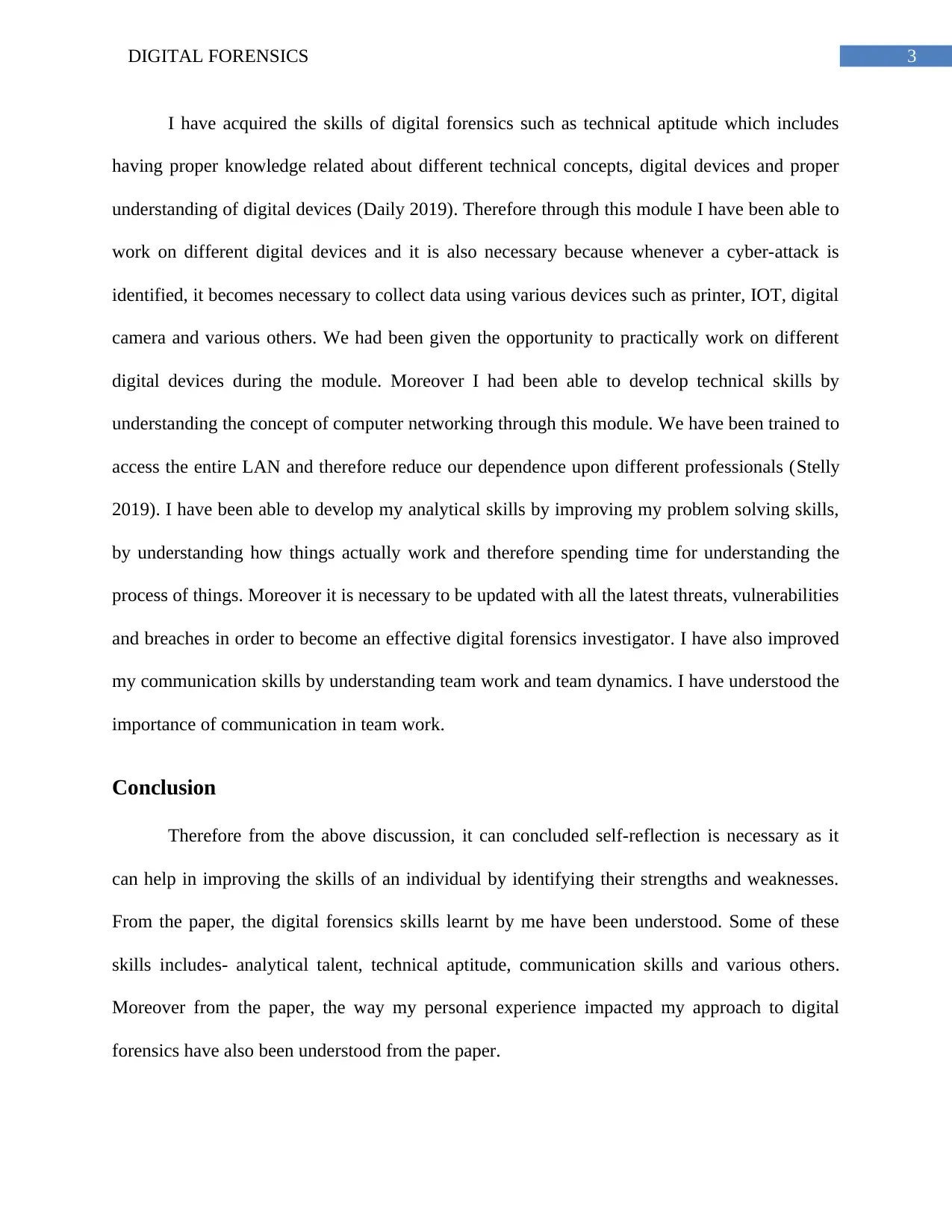
3DIGITAL FORENSICS
I have acquired the skills of digital forensics such as technical aptitude which includes
having proper knowledge related about different technical concepts, digital devices and proper
understanding of digital devices (Daily 2019). Therefore through this module I have been able to
work on different digital devices and it is also necessary because whenever a cyber-attack is
identified, it becomes necessary to collect data using various devices such as printer, IOT, digital
camera and various others. We had been given the opportunity to practically work on different
digital devices during the module. Moreover I had been able to develop technical skills by
understanding the concept of computer networking through this module. We have been trained to
access the entire LAN and therefore reduce our dependence upon different professionals (Stelly
2019). I have been able to develop my analytical skills by improving my problem solving skills,
by understanding how things actually work and therefore spending time for understanding the
process of things. Moreover it is necessary to be updated with all the latest threats, vulnerabilities
and breaches in order to become an effective digital forensics investigator. I have also improved
my communication skills by understanding team work and team dynamics. I have understood the
importance of communication in team work.
Conclusion
Therefore from the above discussion, it can concluded self-reflection is necessary as it
can help in improving the skills of an individual by identifying their strengths and weaknesses.
From the paper, the digital forensics skills learnt by me have been understood. Some of these
skills includes- analytical talent, technical aptitude, communication skills and various others.
Moreover from the paper, the way my personal experience impacted my approach to digital
forensics have also been understood from the paper.
I have acquired the skills of digital forensics such as technical aptitude which includes
having proper knowledge related about different technical concepts, digital devices and proper
understanding of digital devices (Daily 2019). Therefore through this module I have been able to
work on different digital devices and it is also necessary because whenever a cyber-attack is
identified, it becomes necessary to collect data using various devices such as printer, IOT, digital
camera and various others. We had been given the opportunity to practically work on different
digital devices during the module. Moreover I had been able to develop technical skills by
understanding the concept of computer networking through this module. We have been trained to
access the entire LAN and therefore reduce our dependence upon different professionals (Stelly
2019). I have been able to develop my analytical skills by improving my problem solving skills,
by understanding how things actually work and therefore spending time for understanding the
process of things. Moreover it is necessary to be updated with all the latest threats, vulnerabilities
and breaches in order to become an effective digital forensics investigator. I have also improved
my communication skills by understanding team work and team dynamics. I have understood the
importance of communication in team work.
Conclusion
Therefore from the above discussion, it can concluded self-reflection is necessary as it
can help in improving the skills of an individual by identifying their strengths and weaknesses.
From the paper, the digital forensics skills learnt by me have been understood. Some of these
skills includes- analytical talent, technical aptitude, communication skills and various others.
Moreover from the paper, the way my personal experience impacted my approach to digital
forensics have also been understood from the paper.
Paraphrase This Document
Need a fresh take? Get an instant paraphrase of this document with our AI Paraphraser
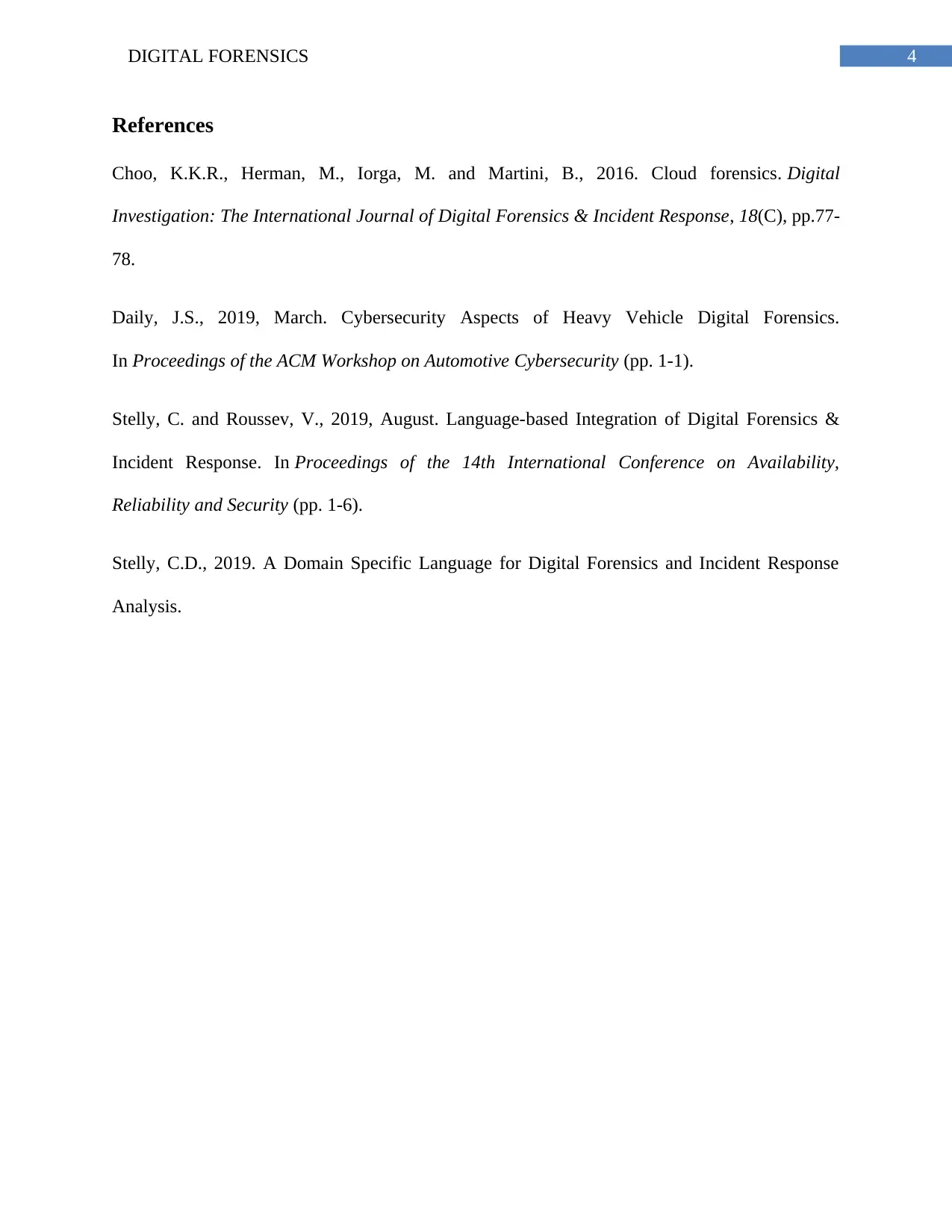
4DIGITAL FORENSICS
References
Choo, K.K.R., Herman, M., Iorga, M. and Martini, B., 2016. Cloud forensics. Digital
Investigation: The International Journal of Digital Forensics & Incident Response, 18(C), pp.77-
78.
Daily, J.S., 2019, March. Cybersecurity Aspects of Heavy Vehicle Digital Forensics.
In Proceedings of the ACM Workshop on Automotive Cybersecurity (pp. 1-1).
Stelly, C. and Roussev, V., 2019, August. Language-based Integration of Digital Forensics &
Incident Response. In Proceedings of the 14th International Conference on Availability,
Reliability and Security (pp. 1-6).
Stelly, C.D., 2019. A Domain Specific Language for Digital Forensics and Incident Response
Analysis.
References
Choo, K.K.R., Herman, M., Iorga, M. and Martini, B., 2016. Cloud forensics. Digital
Investigation: The International Journal of Digital Forensics & Incident Response, 18(C), pp.77-
78.
Daily, J.S., 2019, March. Cybersecurity Aspects of Heavy Vehicle Digital Forensics.
In Proceedings of the ACM Workshop on Automotive Cybersecurity (pp. 1-1).
Stelly, C. and Roussev, V., 2019, August. Language-based Integration of Digital Forensics &
Incident Response. In Proceedings of the 14th International Conference on Availability,
Reliability and Security (pp. 1-6).
Stelly, C.D., 2019. A Domain Specific Language for Digital Forensics and Incident Response
Analysis.
1 out of 5
Related Documents
Your All-in-One AI-Powered Toolkit for Academic Success.
+13062052269
info@desklib.com
Available 24*7 on WhatsApp / Email
![[object Object]](/_next/static/media/star-bottom.7253800d.svg)
Unlock your academic potential
Copyright © 2020–2026 A2Z Services. All Rights Reserved. Developed and managed by ZUCOL.




